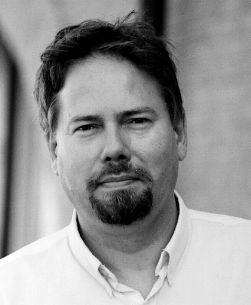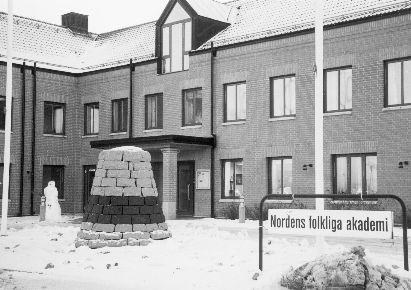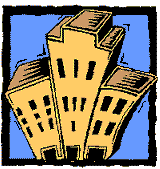 A
farewell interview with Arne Carlsen about seven years of Baltic-Nordic
co-operation within the field of formal and non-formal adult education.
A
farewell interview with Arne Carlsen about seven years of Baltic-Nordic
co-operation within the field of formal and non-formal adult education.
On April 1 1999 the period with Arne Carlsen as the director of the Nordic Folk Academy will come to an end and with that also his editorial responsibilities for the Baltic Sea Dialogue. Seven years ago he started a co-operation that became a platform for a wide range of initiatives and where the Baltic-Nordic popular adult education co-operation was given continuity and was allowed to be developed. Today this co-operation comprises nearly the whole of the Baltic Sea area.
When Arne Carlsen leaves his duties as a director for the benefit of academic research, this does not mean an end to the work the NFA does in the Baltic Sea area. Antra Carlsen will resume all of the editorial responsibilities for the Baltic Sea Dialogue, and she will continue as project leader for the new data base and with network co-operation and course responsibilities.
And what started out as an urge to re-establish contact among the small countries around the Baltic Sea is now growing towards Europe, says Arne Carlsen in this farewell interview.
It all started in a car on the way from a conference in Sønderborg organised by the Danish Ministry of Education in the early spring of 1992. Arne Carlsen and Dorte Jeppesen, who was a consultant at the Nordic Council of Ministers, talked about ‘the singing revolution’ that had taken place a few months earlier.
Arne Carlsen: We told ourselves that it was time to enter a Nordic-Baltic co-operation on democracy, formal and non-formal adult education. As a result of this FOVU financed a study visit for Eeva Siirala from the Finnish Adult Education Association and me in order to look at the possibilities for such co-operation. It was in May that we travelled the Baltic countries and visited the ministries, and they immediately showed a great interest in our co-operation ideas. And already that same summer 1992 I organised a six weeks NFA course, that was implemented in such a way that we spent four weeks at the Academy and 14 days in Denmark, Norway and Sweden driving around in a bus on study visits. On that course participated most of the central figures from the ministries at the time, from the central administration and from teacher training departments at universities.
Nordic inspiration
The ambition was already from the start to strengthen the democratic development in the whole of the Nordic region, including the Baltic Sea area. And this could be done by showing the Baltic colleagues how the Nordic countries have anchored their participatory democracy in the work and activities of NGOs and in popular adult education – to show what we have done and to inspire Baltic people to create their own model and then support them in their choice.
How did your commitment begin?
Arne Carlsen: Many people have asked themselves how they got interested in co-operation with the adjacent areas. For some organisations and institutions it was probably a mission, which can have its historical explanation in the co-operation that existed between the Baltic and Nordic countries during the independence, the period between the wars. A great deal also happened during the Second World War and immediately after, which could explain the latent wish to be in contact with each other again.
I myself felt more like I was part of a big historic movement, where we all of a sudden were given the opportunity to further our efforts to develop together with all the neighbours in the whole region. To me it was never a question of directly transferring our Nordic models or wanting our Baltic colleagues to implement them as such. What we had done might inspire our Baltic neighbours to build something out of their own potentials so that we together could be part of an even bigger international movement and give the whole region a chance to develop.
The Summer Academy activities continued – who participated?
Arne Carlsen: We had three 6-week Summer Academies. The second one, in 1993, was aimed at university people that were interested in developing leadership training and the third one, in 1994, targeted education inspectors on the local administrative level. After that the demand for more extensive courses had been met and we then concentrated on organising a range of 2-week courses, that have come into the Nordic Council of Ministers’ Co-operation programme for the areas adjacent to the Nordic region. The courses have dealt with democratic methods in teaching adults, leadership and management in NGOs and integration of environmental issues in adult education.

From mission to co-operation
Who were the first from the Nordic countries to get involved?
Arne Carlsen: Already at the end of the 80’s individual folk high schools and study associations had established a co-operation with some groups in the Baltic states. But it all exploded after ‘the singing revolution’. So when we in 1993 invited Nordic project leaders who worked with the adjacent areas to a conference, it turned out to be a very big one. I think we had more than 80 participants, sitting up till long after midnight for two nights discussing the co-operation and trying to get an overview of what was happening. Everyone was deeply committed and there was a wish to co-operate, a joy. Perhaps a lot of the energy that was there at that time has been channelled in a more professional direction, and co-operation structures have been developed that focus on teacher qualifications and competence development among NGO leaders. And today we are more interested in meeting at courses and conferences where we can share and learn from all that is new. The challenges we face today look basically the same in the whole region.
My impression is that the ties have been stronger between some of the Baltic and some of the Nordic countries?
Arne Carlsen: NFA made a survey in 1994, which showed that more than 90 % of the Finnish projects were with Estonia, for quite natural reasons. But we also found out that over 80 per cent of the Nordic countries’ bilateral projects at that time were with Estonia. So the co-operation has been fairly active, especially between Estonia and Finland/Sweden. In one period the co-operation between Denmark and Latvia was strong, in another the one between Norway and Lithuania. But there is also a strong co-operation between Sweden and Latvia today. So from a more clearly divided co-operation earlier, I think, the picture is more complex and varied today.
What forms of formal and non-formal adult education were there in the Baltic states in 1991?
Arne Carlsen: All the states had a structure, the same as the one in the former Soviet Union. There was what we could call popular universities, a form of study association, which organised courses in ideology but also to some extent also language courses. Besides a large number of locally organised culture courses flourished, even if the educational activities generally were centrally controlled from Moscow. After 1987 an incredible number of NGOs were active either secretly or publicly, dealing with environmental issues and human rights. But as the market economy grew stronger, there wasn’t time to be involved in voluntary work to the same extent. For a few years the situation was such that you had to have at least a couple of different jobs in order to survive. But now the situation has changed and the number of people joining non-governmental organisations is increasing again, not only for leisure-time activities but also for democratic participation.
The Baltic countries today
Could you describe the educational profile of the Baltic states?
Arne Carlsen: In Estonia it has been possible to take an M.A. in andragogy in Tallinn since the end of the 80’s. Latvia has probably had bigger difficulties in this respect whereas Lithuania started an M.A. educational programme for practitioners in Kaunas two years ago. Within liberal adult education Latvia and Lithuania have established regional information offices for adult education, the offices have been supported by the German popular adult education among others. Various other popular adult education organisations and institutions have also been established. The work has so far been effective in Estonia above all, but it seems to grow immensely both in Latvia and Lithuania.
Does the adult education equal the Nordic one now?
Arne Carlsen: No, after all one cannot say that. In the Nordic countries 20-25 per cent of the adult population between 18 and 65 are involved in liberal adult education, and this differs greatly from the Baltic states. However, there are many people joining NGOs now as well as participating in popular adult education.
And how about the formal adult education?
Arne Carlsen: There has been an increase in the co-operation between the Nordic and the Baltic states within the field of formal, qualifying adult education. There is also co-operation between the different countries on the upper secondary level. So it is my impression that this is an area within which co-operation will develop quite a lot in the future.
NFA has had Baltic scholars since 1993. What has been the single most important aspect for them during their stay at the academy?
Arne Carlsen: It probably wasn’t very easy for the first Baltic scholars to be here. The only one you could turn to in many instances was yourself and you had to follow up your own ideas alone, both those having to do with the studies as well as the actual study visits. But all this is much easier today. Our library has often been applauded by those who have studied here. However, I also believe that the personally tailored study visits for each and every scholar who has spent some time with us has enriched their work. The relevant literature in our library, the building up of a wide Nordic network with both people and institutions have in the long run lead to very practically oriented co-operation – it is difficult to estimate what exactly came out of each visit, but I have got the impression that these study visits tailored to suit everyone’s personal needs have given extremely good results, even if it is complicated to establish such contacts, and it is difficult and time-consuming work.
The co-operation grows
Is the fact that today there is more literature in English available at NFA a result of the increased interest in international co-operation in the Nordic countries?
Arne Carlsen: It has been our policy to concentrate more than before on buying books in English for our Baltic scholars. The scholarship month has also developed towards being a European scholarship month, where Nordic, Baltic and European scholars meet, arrange mini-seminars and discussions in English, and to a greater extent use literature in English.
At what point was it natural to involve Northwest Russia?
Arne Carlsen: The Nordic Council of Ministers involved Northwest Russia. The work I have had the pleasure to be involved with here at the Nordic Folk Academy has mainly focused on the three Baltic states, but last year we opened up for Northwest Russia, Kaliningrad and to some extent also for the northern parts of Poland and Germany; co-operation around the Baltic Sea area. I believe it’s because the Nordic countries are small and so are the Baltic states that it has been so easy to immediately establish co-operation. We have seen that the work we have done here at the NFA, with good economic support from the Nordic Council of Ministers and the national Ministries of Education and with many, many national and Nordic organisations has had a great effect and will continue to have so in the future in the Baltic states, partly because they are small. And to us it has been just as obvious that it is hard to leave an impact that matters on the giant Russia. But we have opened up, we have had scholars from Northwest Russia, we invited Northwest Russian participants to the last three courses held at NFA and our experience from that was very good. Any disagreements that could have been triggered between Baltic and Russian participants have occurred to a much lesser extent than we could expect. And therefore I hope that the co-operation programme between the NFA, Northwest Russia and the Baltic countries will continue also after I have left.
Warmth, culture and democracy
What have you learnt yourself from the Baltic formal and non-formal adult education?
Arne Carlsen: I believe the cultural and social dimensions of the non-formal adult education have given me the biggest insights into the enormously rich cultural life in the Baltic states. On this platform we could meet very easily in the beginning and that surprised me. The warm human meetings with the people from the Baltic cultures, the very personal meetings, have probably given me the most.
You refer to social and cultural dimensions - could it be that the Baltic non-formal adult education is closer in resemblance to the Nordic one as it was in the beginning?
Arne Carlsen: I think it is very much because of the co-operation with the Baltic states that we from Nordic non-formal adult education have rediscovered the democracy aspect. We realised somewhere in the mid 90’s that this is a particularly important part of the non-formal adult education, it’s power to foster democracy. And I don’t think we would have done that without the historical reference to where it all began: the need in people’s movements to learn democracy, a new social class which got political rights and was to function in a parliamentary way. And today globalisation raises again a need to have democratic influence on our own future.
Anna Vallgårda
